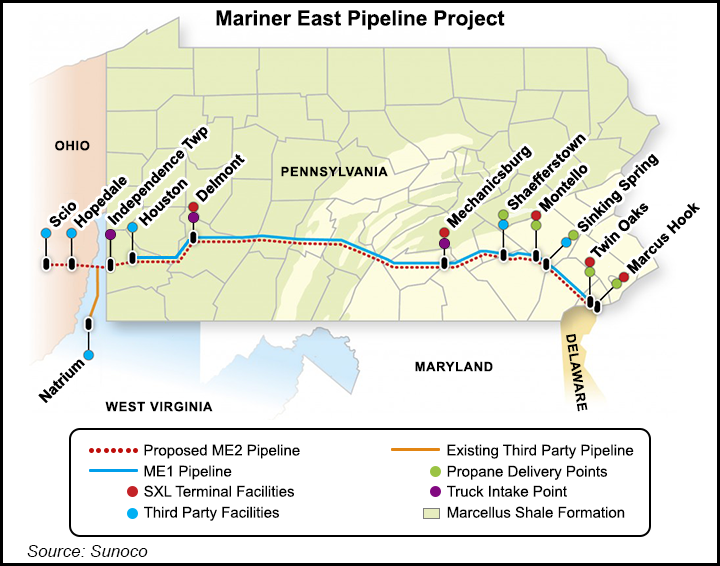Infrastructure | NGI All News Access
Enviros Drop Mariner East 2 Permit Appeal, Settle With Pennsylvania Regulators
The Pennsylvania Department of Environmental Protection (DEP) has reached a settlement with the Clean Air Council, Mountain Watershed Association (MWA) and the Delaware Riverkeeper Network to resolve an appeal challenging the state’s permits for the Mariner East (ME) 2 pipeline project that’s been pending for more than a year.

The settlement does not affect any of the 20 water and erosion permits involved in the appeal that the agency issued in February 2017, which allowed Energy Transfer Partners LP (ETP) affiliate Sunoco Pipeline LP to start construction. Instead, the agency has agreed to improve its policies to help other projects avoid the dozens of spills, violations and other issues that have plagued ME 2.
DEP Secretary Patrick McDonnell said the agency has resolved all claims related to the permits, “while incorporating new processes to ensure that future pipeline projects learn from the mistakes made by Sunoco in implementing the project.” He added that “DEP will continue to conduct vigorous oversight to ensure compliance with the conditions of the permits and will issue enforcement actions as necessary.”
MWA spokeswoman Melissa Marshall said that while “the devastation that Sunoco caused is indefensible and should never have occured, this settlement is a critical first step toward preventing tragedies such as those we’ve seen with the Mariner East 2 from ever happening to anyone again.”
The environmental groups said the settlement requires that DEP create and enhance “protective policies” to better address public health and environmental impacts from pipeline projects. The agency is to provide the public with greater transparency, more access to permit application materials online and additional opportunities to participate in the regulatory process. A new stakeholder group is also to be created that would include environmental organizations, to “collaborate on best practices to reduce harms from pipeline construction.”
Prior to issuing the permits, DEP said that due to the complexity of the project, it would enhance and extend public participation for water obstruction/encroachment and erosion/sediment control permits, which at the time pushed back the project’s schedule. The groups filed their appeal with the Environmental Hearing Board when the permits were issued last year.
The agency reached a separate settlement with the groups last summer requiring additional safeguards for the remainder of construction on the project. It was later violated, and the DEP slapped Sunoco with a historic $12.6 million fine related to those transgressions and others.
The latest settlement, ETP said, will not impact completion of ME 2. Work in Chester County’s West Whiteland Township is still on hold after an administrative law judge in May ordered it stopped. The order was issued in response to a complaint from a state senator, which was filed over safety concerns after sinkholes were discovered in the project area earlier this year. The Pennsylvania Public Utility Commission upheld the order and is reviewing reams of information that Sunoco was ordered to submit so commissioners can better make a decision about how to proceed, putting a project that’s nearly complete in limbo.
ME 2 and a third pipeline would run parallel for about 350 miles to move ethane, butane and propane from processing facilities in Ohio, Pennsylvania and West Virginia to the Marcus Hook Industrial Complex. ME 2, with a designed capacity of 345,000 b/d, was initially expected to be online at the end of 2016, but construction setbacks, lawsuits and regulatory snags have hindered progress. Combined with 2X and ME 1, which has also been offline for nearly three months this year, all three pipelines would move 745,000 b/d and provide a key outlet for constrained Appalachian liquids.
Service interruptions on ME 1 and the ME 2 delays have forced producers to find workarounds. The issues have also periodically stopped exports at Marcus Hook, which has limited storage available. Given the delays on ME 2, Sunoco plans to use an existing 12-inch refined products pipeline in Chester and Delaware counties to help it meet customer obligations and transport liquids to the terminal near Philadelphia.
© 2024 Natural Gas Intelligence. All rights reserved.
ISSN © 2577-9877 | ISSN © 2158-8023 |
